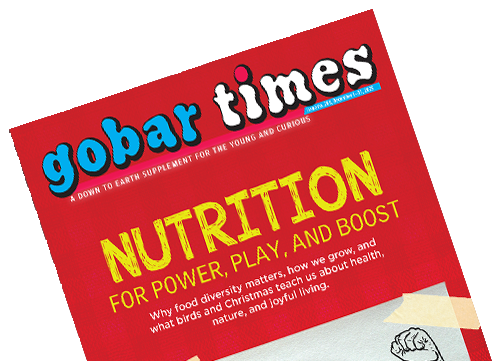
When we think about biodiversity, we usually think only of animals, birds, insects and plants. We forget that fungi are also biodiversity. According to Royal Botanic Gardens, Kew in the UK, fungi are ‘distinctive organisms that digest their food externally by secreting enzymes into the environment and absorbing organic matter...

A Freedom Pledge on greenery—a promise to protect the forests and biodiversity of our planet.

A first-hand experience narrating the extraordinary about the ordinary—crow.
******************************************
Do you remember your Mum pointing out a kauua to you as a kid? A crow is certainly among the first non-humans we notice as babies. In fact, children very quickly pick up their 'ka/kaw' in spite of its harshness, and repeat it like a sweet lullaby. This is how, crows become our best, flying companions—they fly wherever humans go! Moreover, they also display many of our traits...

Have you ever wondered what wild-lifers do? What inspires them to go to work in the jungle? How they protect themselves in the jungle? How they count tigers? Dr Qamar Qureshi of the Wildlife Institute of India answers questions about tigers and the work he does with them.

According to 2018 estimates, India has onl 2,967 tigers. Have you ever wondered how does one count tigers? What systems and mechanisms are used? How reliable are the numbers that are finally estimated and released? Most importantly, why do we count tigers? We invite children and teachers to a special Young Environmentalist MasterClass on the subject of counting of tigers with one of India’s foremost wildlife experts, Qamar Qureshi of the Wildlife Institute of India.

Active conservation efforts of the state government and the Bishnoi tribe together are yielding positive results in rescuing the famous Great Indian Bustards.
Where does electricity come from? Most of us have not seen the power stations where it is generated but we have all seen the wires that deliver electricity to our homes. Yes, those wires, hanging overhead on the streets, which seem to have been built for pigeons and crows to perch upon...

An inspiring story of an ordinary Adivasi woman, Jamuna Tudu, who used the superpowers of diligence and persistence to defeat the timber mafias in Jharkhand.
I am sure all of you have seen Tarzan cartoons. What if I told you that we have a real Tarzan in India and that too a lady! Jamuna Tudu of the Santhal tribe of Central India, began her journey towards becoming ‘Lady Tarzan’ in 2000. This was when she got married, barely at the age of 17, and moved from her childhood home in Odisha to her husband’s village in Jharkhand...
The Cheetah is the fastest terrestrial animal on earth, capable of galloping at speeds of up to 100 km/h. The Cheetah, which was extinct in the 1950s in India, is about to make a comeback later this year. About 10 cheetahs, 5 of them females, will be brought to Madhya Pradesh’s Kuno-Palpur Wildlife Sanctuary in November 2021.

Indians were probably the first to domesticate the red jungle fowl and realize its medicinal and nutritional worth.

The lockdown has given us an opportunity to review our take on the prisons we built for our recreation.

Some trace the origin of COVID-19 virus to bats but these creatures of the night are more than virus carriers.

The forest, capable of meeting our basic needs of food, shelter and fuel, can act as a model of sustainable living for all of us.

Thanks to the trade and imperial ventures of humans, these disease-causing organisms could cross regional boundaries and spread infection.
Humans are really strange. They love giving awkward names to other living beings. For example, I am called a 'virus'. In Latin, it means poison or poisonous liquid. Well, humans do seem to enjoy giving names carrying negative connotations. My other name, 'pathogen', is not encouraging either. So, what is a pathogen? If you Google it, you will get the following explanation: 'Pathos' is the Greek word for disease and genes means 'born of'.

Scientists have mapped how increasing temperatures will impact the population and distribution of the disease spreading mosquitoes in the world

Stop behaving like humans. Set a final deadline for our human eradication programme.

Learn how to create a mini aquarium model and watch the vibrant colours of the sea enhance the look of your house

What tigers eat and the space they occupy protects the health of their entire ecosystem.

Bees are indispensable pollinators and exist in all types of climate—from forests in Europe, deserts in Africa to the Arctic Circle. But what would happen if all of them just disappeared one day? Here's a look.
*******************************************
What if one day you step into your house and find there is no food. The refrigerator is empty and you switch on the television to know more. A news channel tells you that there is a food crisis and the reason for this is that there are no bees left in the world...

